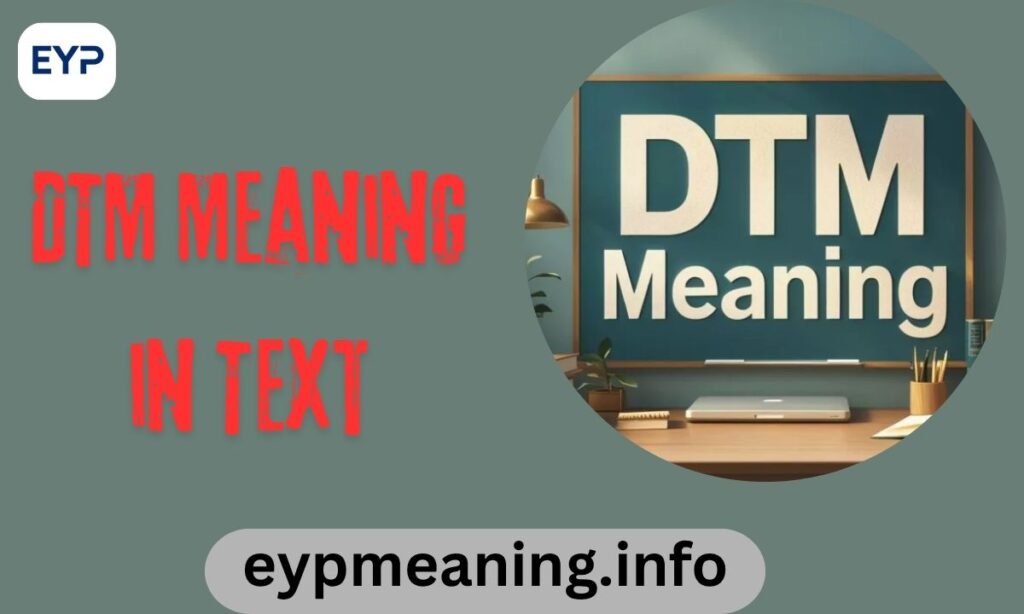In today’s fast-paced digital world, text abbreviations have become the language of modern communication. DTM is one such acronym that carries significant emotional weight and can drastically impact your relationships. Whether you’ve received this message from a friend, seen it on social media, or are curious about its meaning, understanding DTM is crucial for navigating online interactions.
This powerful three-letter abbreviation stands for “Dead To Me” and represents one of the harshest ways to end communication with someone. Let’s dive deep into what DTM really means, when it’s appropriate to use it, and how to respond when someone declares you’re DTM in their life.
What Does DTM Mean in Text?
DTM stands for “Dead To Me” in text messaging and online communication. This phrase indicates that someone has completely cut off emotional connection with another person. When someone says you’re DTM, they’re essentially declaring that the relationship is over and they want no further contact.
The expression carries significant emotional weight. It represents a final decision to end communication and remove someone from one’s life. DTM is not a temporary disagreement—it signals permanent severance. The phrase originated from dramatic television shows and movies but has evolved into everyday digital vocabulary.
In digital contexts, DTM appears in various situations. Friends might use it after serious betrayals. Romantic partners may declare it after breakups. Even acquaintances use it when they feel profoundly disrespected. The term has become shorthand for expressing ultimate disappointment and relationship termination.
Example:
Here are common scenarios where DTM appears in conversations:
- “After what you did, you’re DTM to me” – Following a major betrayal or broken trust
- “Don’t bother texting. You’re DTM” – Ending communication permanently after repeated issues
- “She said I’m DTM now” – Reporting that someone has cut off the relationship
- “You lied about something so important. DTM” – Responding to deception with finality
- “He’s DTM after missing my wedding” – Declaring someone irrelevant after a significant letdown
Is DTM Polite or Rude?
DTM is considered harsh and confrontational in most communication contexts. The phrase carries strong negative connotations and leaves no room for reconciliation. It’s a definitive statement that burns bridges rather than builds them.
Using DTM shows emotional intensity but lacks diplomatic grace. The abbreviation delivers maximum impact with minimum words, making it feel cold and dismissive. Recipients often perceive it as unnecessarily cruel, even when anger feels justified. Professional settings absolutely prohibit this language, as it violates workplace communication standards.
However, context matters significantly. Among close friends who understand dramatic humor, DTM might be used playfully without serious intent. Teenagers and young adults sometimes throw around the phrase casually. But even in informal settings, the risk of misunderstanding remains high. The safest approach treats DTM as inappropriate for respectful communication.
| Context | Appropriateness | Risk Level |
| Professional emails | Never appropriate | Extremely high |
| Workplace chats | Highly inappropriate | Very high |
| Casual friends | Risky, often too harsh | Moderate to high |
| Close personal relationships | Depends on dynamic | Variable |
| Social media posts | Can damage reputation | High |
| Anonymous forums | More accepted but still aggressive | Moderate |
Professional Alternatives to “DTM”
Workplace communication requires diplomatic language that maintains professionalism even during conflicts. Instead of using DTM, consider these appropriate alternatives that convey boundaries without hostility.
“I need to step back from this relationship” communicates distance while maintaining dignity. This phrasing acknowledges the situation without attacking the other person. It leaves room for professional coexistence if necessary. “I prefer to keep our interactions strictly professional moving forward” sets clear boundaries in work environments. This statement protects your interests without creating unnecessary drama.
“I think it’s best we limit our communication” offers a softer approach to establishing distance. The phrase sounds measured and thoughtful rather than reactive. “I need some space to process this situation” buys time while avoiding permanent declarations. This language demonstrates emotional intelligence and maturity.
For more formal contexts, try “I’ve decided to redirect my energy elsewhere” or “I’m choosing to focus on other priorities right now.” These alternatives communicate your decision without inflammatory language. They preserve professional relationships and protect your reputation.
- “I need to establish healthier boundaries”
- “This relationship no longer serves either of us”
- “I’m choosing to move forward separately”
- “Let’s maintain a respectful distance”
- “I think we should part ways professionally”
Polite or Casual Alternatives to “DTM”
Not every situation requires cutting someone off completely. Softer alternatives allow you to express disappointment while leaving communication channels partially open. These phrases work better for casual relationships and friendships.
“I’m pretty hurt right now” expresses your feelings without severing ties permanently. This honesty invites dialogue rather than shutting it down. “I need some time away” suggests temporary rather than permanent distance. It acknowledges current feelings while allowing for future reconciliation.
“This friendship feels different now” recognizes changed dynamics without dramatic finality. The statement opens conversation about what happened and whether repair is possible. “I’m disappointed and need space” combines emotional honesty with a clear boundary request. This balance maintains respect while protecting yourself.
For lighthearted contexts where drama isn’t warranted, try “You’re on my bad list today” or “We’re taking a friendship break.” These casual phrases acknowledge tension without nuclear declarations. They suit situations where emotions run high temporarily but relationships remain salvageable.
15 Polished Reply Examples for “DTM”
Receiving a DTM message can feel shocking and painful. Your response determines whether the situation escalates or resolves. These 15 carefully crafted replies suit different scenarios and emotional states.
Casual & Playful Replies
Use these when the DTM seems exaggerated or you share a playful dynamic:
- “Wow, that escalated quickly! Can we talk about what’s actually bothering you?”
- “Dramatic much? Let’s discuss this like adults when you’re ready.”
- “I’m guessing you’re upset. I’m here when you want to actually communicate.”
- “Okay, taking a break then. Hope you feel better soon.”
- “That seems pretty final. Let me know if you change your mind.”
Gentle & Supportive Replies
These responses work when you want to de-escalate and show understanding:
- “I can tell you’re hurting. I respect your decision and wish you well.”
- “I’m sorry things reached this point. I’ll give you the space you need.”
- “Your feelings are valid. I’m sad it ended this way but I understand.”
- “I never wanted to hurt you. I’m genuinely sorry for whatever caused this.”
- “If you ever want to talk, I’m willing to listen and make things right.”
Professional & Polite Replies
Use these for work situations or formal relationships:
- “I understand you need distance. I’ll respect that boundary moving forward.”
- “I recognize this situation has become untenable. I wish you success in your endeavors.”
- “I appreciate you communicating your decision clearly. Let’s keep things professional.”
- “Noted. I’ll ensure our future interactions remain strictly business-related.”
- “I respect your choice. Please let me know if any professional matters require discussion.”
When to Use or Avoid “DTM”
Understanding appropriate contexts for DTM prevents communication disasters. This powerful phrase should be reserved for truly final situations, not everyday disappointments.
✅ Use it when:
- Someone has severely violated your trust repeatedly and shown no genuine remorse
- You’ve exhausted all other communication methods and nothing has changed
- Your safety or wellbeing is genuinely threatened by continuing the relationship
- You’re among very close friends who understand your dramatic communication style
- The relationship has become toxic and professional help suggests complete separation
- Clear boundaries have been ignored multiple times despite explicit warnings
❌ Avoid it when:
- You’re angry in the moment but might regret permanent statements later
- The person made a single mistake that could be forgiven with proper communication
- Professional relationships are involved where you must maintain workplace civility
- You’re communicating with family members where relationships are complicated
- The issue could be resolved through honest conversation and understanding
- You might need this person’s help or cooperation in the future
Think carefully before sending DTM. Once typed and sent, these words cannot be unsaid. The permanence of digital communication means your harsh moment becomes documented history. Consider sleeping on it before making irreversible declarations.
Why Understanding Nuance Matters
Communication nuance separates mature adults from reactive teenagers. The way you express disappointment, anger, or hurt reveals your emotional intelligence. DTM represents the bluntest possible instrument in a toolbox that should contain many precision tools.
Understanding contextual appropriateness prevents unnecessary relationship damage. Not every offense deserves permanent severance. Many conflicts arise from miscommunication, different perspectives, or temporary stress. Rushing to DTM eliminates possibilities for growth, understanding, and reconciliation.
Digital permanence amplifies the importance of thoughtful communication. Screenshots circulate. Messages get forwarded. Your harsh moment becomes public record. Professional contacts, potential employers, and future friends might see your communication style. Maintaining dignity even during conflict protects your reputation long-term.
The best communicators express strong feelings without burning bridges unnecessarily. They set firm boundaries while leaving dignity intact for everyone involved. This skill serves you throughout life—in careers, friendships, romantic relationships, and family dynamics.
DTM in Pop Culture and Social Media
Social media has amplified DTM usage significantly over the past five years. The phrase appears regularly on Twitter, Instagram, TikTok, and Facebook. Influencers use it for dramatic effect, often making DTM announcements about former friends, brands, or controversial figures.
Reality television popularized the dramatic declaration. Shows like “Keeping Up with the Kardashians,” “Real Housewives,” and “Love Island” featured cast members declaring others “dead to them.” These televised moments normalized extreme language for relationship conflicts. Viewers adopted the phrase, bringing it into everyday digital vocabulary.
Meme culture embraced DTM for humorous exaggeration. People joke about foods being DTM after disappointing experiences. Brands get declared DTM after poor customer service. Celebrities face DTM declarations from former fans. The phrase evolved from serious relationship termination to flexible dramatic expression.
TikTok trends frequently feature DTM content. Users create videos explaining why someone became DTM. Comment sections fill with DTM declarations. The platform’s young demographic uses the phrase more casually than older generations, sometimes losing sight of its serious original meaning.
How to Replace DTM in Specific Scenarios
Different situations require tailored communication approaches. These scenario-specific alternatives help you express yourself appropriately across various contexts.
🗨️ In Emails:
Professional email communication demands measured, respectful language regardless of frustration levels. Instead of anything resembling DTM, use these alternatives:
- “I’ve decided to discontinue our professional relationship effective immediately.”
- “After careful consideration, I believe it’s best we pursue separate paths.”
- “I’m respectfully withdrawing from this project/partnership/collaboration.”
These phrases maintain professionalism while clearly communicating your decision. They leave documentation that won’t embarrass you later. Email permanence requires extra care with word choice since messages can be forwarded indefinitely.
🗨️ In Group Chats:
Group dynamics complicate direct communication. Declaring someone DTM publicly humiliates them and makes everyone uncomfortable. Better approaches include:
- Addressing issues privately through direct messages rather than group announcements
- “I need to step back from this conversation for now” – removes yourself without attacking others
- “Let’s discuss this separately” – acknowledges conflict without group drama
- Simply leaving the group quietly if the situation warrants complete distance
Public callouts rarely end well. They create factions, force others to choose sides, and permanently damage multiple relationships. Handle serious conflicts privately whenever possible.
🗨️ In Personal Conflicts:
Personal relationships allow more emotional honesty than professional contexts. Still, thoughtful communication serves you better than explosive declarations:
- “I feel betrayed and need significant time apart to heal”
- “This relationship isn’t healthy for me anymore”
- “I’m choosing to prioritize my wellbeing by creating distance”
- “I can’t continue this friendship under current circumstances”
These statements communicate serious intent without the finality of DTM. They express your feelings clearly while maintaining personal dignity. Even in deeply personal conflicts, measured language prevents regret later.
Frequently Asked Questions
What does DTM mean in texting?
DTM means “Dead To Me” in text messaging, indicating someone has completely cut off emotional connection and communication with another person.
Is DTM always permanent?
DTM typically implies permanent severance, though some people use it dramatically for temporary anger. Context determines actual permanence.
Can you use DTM professionally?
Never use DTM in professional contexts. It’s highly inappropriate for workplace communication and damages your professional reputation.
How should I respond to DTM?
Respond calmly and respectfully, acknowledge their feelings, respect their boundary, and avoid escalating the situation further.
Is DTM the same as ghosting?
No, DTM is an explicit declaration while ghosting means disappearing without explanation. DTM communicates the cutoff directly.
Do young people use DTM more often?
Yes, teenagers and young adults use DTM more frequently, often less seriously than older generations who reserve it for major conflicts.
What’s a polite alternative to DTM?
“I need to establish some distance” or “This relationship no longer works for me” communicate boundaries without harshness.
Can friendships recover after DTM?
Recovery is possible but difficult. The harsh declaration creates significant damage that requires sincere apologies and considerable time to heal.
Why is DTM so popular online?
Social media and reality TV popularized DTM by normalizing dramatic relationship declarations for entertainment and emotional expression.
Does DTM appear in other contexts?
DTM sometimes means “doing too much” in different contexts, though “Dead To Me” remains the most common meaning.
Conclusion
DTM represents powerful language that should be used sparingly and thoughtfully. Understanding what “Dead To Me” truly means helps you navigate digital communication more effectively. The phrase signals complete relationship termination, carrying emotional weight that cannot be easily undone.
Choose your words carefully in all communication contexts. Professional settings absolutely prohibit DTM usage. Casual relationships benefit from softer alternatives that preserve dignity. Even serious conflicts often resolve better with measured language rather than nuclear declarations. Your communication style shapes your relationships and reputation.






